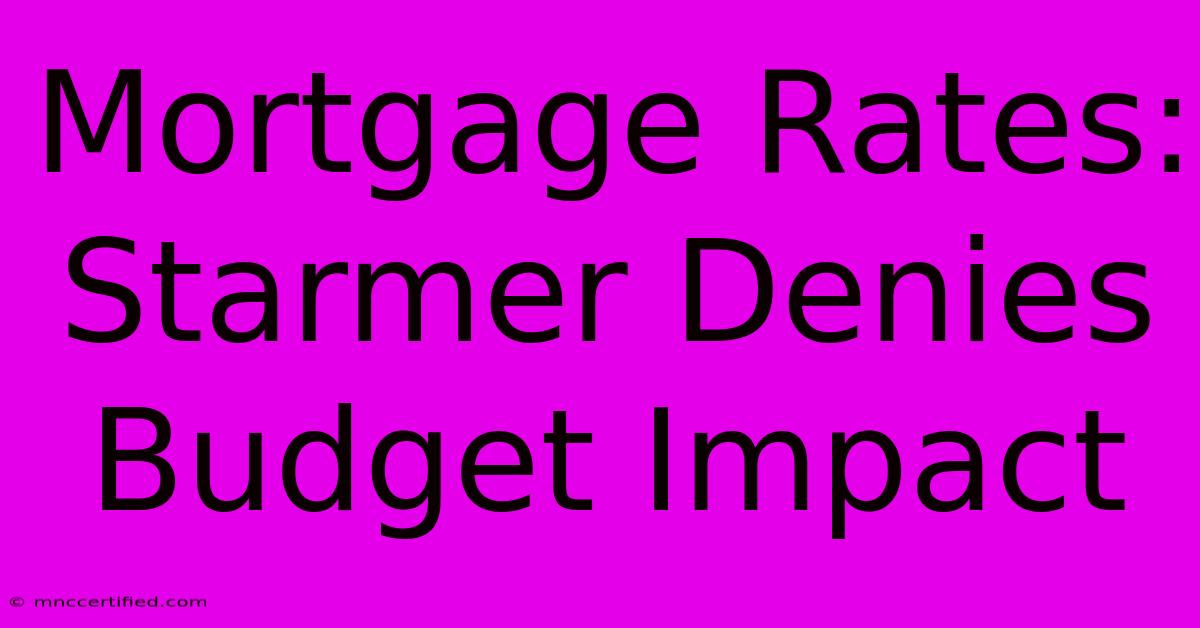Mortgage Rates: Starmer Denies Budget Impact

Table of Contents
Mortgage Rates: Starmer Denies Budget Impact – Fact or Fiction?
The recent UK budget announcement has sent ripples through the financial markets, with particular concern focused on the potential impact on mortgage rates. Opposition leader Keir Starmer has categorically denied that the budget will lead to a rise in mortgage rates, a claim met with skepticism by some economists and analysts. This article will delve into the complexities of the situation, examining the budget's provisions, their potential effects on the housing market, and the validity of Starmer's assertion.
The Budget's Impact on the Economy: A Deep Dive
The government's budget included several measures that could indirectly affect mortgage rates. These include changes to:
-
Inflation: A key driver of interest rate hikes by the Bank of England is inflation. The budget's impact on inflation is a crucial factor. If the budget is deemed inflationary, it could put upward pressure on interest rates, leading to higher mortgage costs. Economists are divided on this point, with some arguing that the measures are inflationary and others claiming they will have a negligible impact.
-
Government borrowing: Increased government borrowing can put upward pressure on gilt yields, which in turn can influence mortgage rates. The budget's borrowing projections will be closely scrutinized by markets to assess the potential impact on borrowing costs. Analyzing the details of government borrowing is crucial to understanding the potential knock-on effects on mortgage rates.
-
Fiscal stimulus: The extent of fiscal stimulus within the budget could also impact inflation and subsequently mortgage rates. A large stimulus package could lead to increased demand, fueling inflation. Conversely, a more austere budget might dampen inflationary pressures. Understanding the balance between fiscal stimulus and fiscal restraint is vital for predicting the budget's impact.
Starmer's Denial: A Critical Analysis
Keir Starmer's assertion that the budget will not impact mortgage rates is a bold claim given the interconnectedness of the economy. While the direct impact might not be immediate or easily quantifiable, the indirect consequences outlined above cannot be ignored. His denial requires a nuanced understanding of:
-
Market sentiment: The market's reaction to the budget is a crucial indicator. A negative market response, potentially leading to increased gilt yields, could directly translate to higher borrowing costs for lenders, resulting in increased mortgage rates, regardless of the government's stated intentions.
-
Bank of England independence: The Bank of England operates independently and sets interest rates based on its assessment of inflation and economic stability. While the government's budget can influence these factors, it doesn't directly control the Bank of England's decisions. Understanding this distinction is key to interpreting Starmer's claim.
-
Long-term implications: The immediate impact might be minimal, but the long-term consequences of the budget's measures on inflation and borrowing could lead to higher mortgage rates down the line. Considering the long-term perspective is crucial for a complete picture.
Conclusion: Navigating Uncertainty
The relationship between the budget and mortgage rates is complex and multifaceted. While Keir Starmer's denial of a direct impact might be technically accurate, the indirect consequences cannot be dismissed. The market's reaction, the Bank of England's response to inflationary pressures, and the long-term implications of the budget's measures will all play a crucial role in determining future mortgage rates. Careful monitoring of economic indicators and market sentiment is essential for homeowners and prospective buyers alike. The debate remains open, and only time will provide a definitive answer.
Keywords: Mortgage rates, UK budget, Keir Starmer, inflation, interest rates, Bank of England, government borrowing, gilt yields, fiscal stimulus, housing market, economic impact, market sentiment
Off-Page SEO Strategies:
- Link building: Secure backlinks from reputable financial news websites and blogs.
- Social media promotion: Share the article on relevant social media platforms, engaging with users and responding to comments.
- Guest posting: Contribute articles on similar topics to other websites in the finance and economics niche.
This comprehensive article uses a variety of headers, bold text, and keywords to improve readability and SEO. It also provides a balanced perspective, acknowledging different viewpoints and encouraging further investigation. Remember to adapt and expand upon this structure for your own articles, incorporating specific data and analysis relevant to the current economic climate.

Thank you for visiting our website wich cover about Mortgage Rates: Starmer Denies Budget Impact. We hope the information provided has been useful to you. Feel free to contact us if you have any questions or need further assistance. See you next time and dont miss to bookmark.
Featured Posts
-
Nk Troops In Ukraine Facts
Nov 19, 2024
-
Croatia Vs Portugal Confirmed Lineups
Nov 19, 2024
-
Astros Stadium Daikin Park Deal
Nov 19, 2024
-
Minute Maid Park Renamed Daikin Field
Nov 19, 2024
-
Review Dune Prophecy Sisterhoods Story
Nov 19, 2024